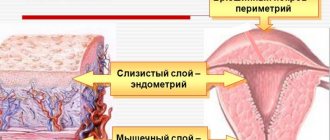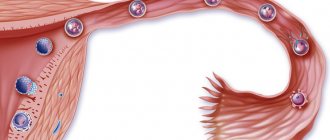Many women are completely unfamiliar or do not understand the processes that occur monthly in their bodies. However, pregnancy and ovulation are natural physiological processes that are closely interconnected, and without one the other cannot exist. But if with the traditional ovulation-pregnancy sequence everything is more or less clear, then what about the reverse option, does ovulation occur during pregnancy, what can this be connected with, why does this happen and how often. All these questions require answers, which will certainly be below.
The last days of waiting are the most exciting moments in a woman’s life.
Ovulation concept
The monthly female cycle is a complex mechanism, the functioning of which occurs in several successive stages. Their periodicity is controlled by certain hormones produced by the internal structures of the body, and conception and subsequent gestation are the final stage of these processes, since they stop the monthly cycle. Ovulation is also one of the stages of the cycle, during which a mature female cell exits into the tube. If pregnancy does not occur, then ovulatory processes occur in the body every month.
- The mature follicle ruptures and the female cell comes out.
- Initially, under the influence of FSH, the follicle grows, lasting until the ovulatory period.
- When the follicle grows to the required size and condition, there is a sharp jump in the level of LH, which promotes egg maturation.
- Then the follicle bursts, the cell comes out - ovulation occurs.
- From the peak of the level of luteinizing hormone to the release of the cell, about 1.5-2 days pass.
- Then the luteal phase begins, during which the cell will move along one of the fallopian tubes into the cavity of the uterine body.
- It is in the tube that fertilization occurs.
After conception, during the gestation period, the mechanism of maturation of female cells may stop; it is extended for the first six months of lactation if the patient is breastfeeding. Simply, during pregnancy, the placenta and corpus luteum secrete progesterone hormone, which inhibits the maturation of new female cells.
What is ovulation
Cyclic changes in a woman’s body begin from the moment of her physical maturation in adolescence. From about 12-13 years of age, a girl’s uterus begins to function fully. During this period, the first menstruation begins.
Ovulation is approximately the middle of a woman’s menstrual cycle, during which a mature egg is released into the uterine cavity. This process is accompanied by rupture of the yellow corpuscle in the ovaries; the uterus is actually preparing to receive sperm, which are sent to inseminate a mature egg. A distinctive feature of this period is an increase in mucus from the cervical canal.
The moment of the onset of menstruation does not indicate the physiological readiness of the body for fertilization. With the onset of menstruation, a girl’s uterus only develops and continues to grow in order to ensure healthy offspring in the future. Early pregnancies at a young age provoke complications during pregnancy and especially during childbirth. The birth canal until the age of 18-19 is immature, the pelvic bones are not ready for the passage of the child’s head.
That's female nature
Ovulation is a sign of full reproductive activity, but if it is absent, then this indicates the presence of problems with women's health. If the egg matures, but conception does not occur, then the factors of infertility must be looked for elsewhere. If the ovulatory period has passed, and conception does not occur for many months, then an extensive comprehensive examination is necessary to identify the true cause of infertility.
After conception, global changes occur in the female body
If conception has occurred, the yellow gland begins to form - a specific temporary glandular organ that produces the progesterone hormone necessary to maintain pregnancy. In the early stages, the corpus luteum also inhibits contractions of the uterine muscles, which helps preserve the embryo in the uterine body until placental tissue is formed.
Under the influence of progesterone, vascular structures grow in the endometrial tissues, which serve as building materials for the developing fetus. Then the endometrial layer begins to secrete a mucous secretion necessary for the complete consolidation of the fertilized egg. The final stage of the cycle is the intensive growth of membranes. Ovulatory processes during pregnancy become meaningless; progesterone hormone prevents the secretion of sex hormonal substances by brain structures.
If conception occurs
Within 12-24 hours, the egg awaits the sperm in the fallopian tube. If they fail to meet, the woman gets her period. Before menstruation, the body experiences a natural hormonal surge, which is accompanied by pain in the lower abdomen and clear vaginal discharge.
In case of fertilization, the egg reaches the uterine cavity and is fixed in its wall. From this moment on, a woman’s hormonal background changes dramatically. The onset of pregnancy does not allow new follicles to mature in the ovary.
If pregnancy has occurred, then the need for maturation of the egg disappears for the entire period of gestation and breastfeeding. This state of affairs is ensured by the corpus luteum and placenta, which produce progesterone. It will inhibit the maturation of new eggs.
The entire female reproductive system in pregnant women is aimed at bearing a child, therefore, in order not to waste the necessary resources, the ovaries temporarily stop fulfilling their duties. During pregnancy, ovulation is no longer necessary.
The body directs all efforts to grow the embryo and ensure its safety.
So, if a woman is pregnant, she does not ovulate: from a physiological point of view, these concepts are incompatible.
In the early stages of pregnancy, the female body changes, adapting to new circumstances: the entire female reproductive system changes, creating favorable conditions for bearing a healthy child.
Why is there no ovulation in the early stages of pregnancy?
When a female cell is fertilized by sperm, the corpus luteum formed after its exit from the follicle does not disappear, as before the next menstruation, but begins to actively grow, as already described above. If another cell begins to mature, a miscarriage may occur. It is the prevention of spontaneous abortion that is the main goal and task of the temporary glandular organ, designed to maintain pregnancy and not harm it. These processes occur through the following mechanisms:
- In the brain structures, the release of specific substances that stimulate egg maturation stops.
- The endometrial uterine layer is transformed, forming the future membranes and amniotic sac.
- The vascular tissues of the walls of the uterine body lose sensitivity to various irritating factors. If they narrow, this can create life-threatening conditions for the child. Therefore, a wide vascular lumen remains throughout pregnancy.
- A new organ is formed that is part of the fetal membrane, i.e. the placenta. It provides all vital processes of the fetus - respiratory, nutritional, and also secretes hormone-like substances.
All these factors inhibit the growth of the ovaries, the pregnant body seems to put them into hibernation mode, so ovulation does not occur during pregnancy, and the absence of menstrual flow indicates successful fertilization.
Ovulation and pregnancy: can it happen, does ovulation occur in the early stages?
Many women know almost nothing about the processes that regularly occur in their reproductive system. The normal monthly menstrual cycle is a complex mechanism consisting of several parts. Their sequential change depends on certain hormones that are released into the woman’s bloodstream. The onset of pregnancy can be the final stage of all these transformations, as it stops the change of phases of the cycle after fertilization.
Ovulation is the phase of the menstrual cycle during which a mature egg is released into the cavity of the fallopian tubes. Along with preparing the inner lining of the uterus (endometrium), this creates conditions for successful fertilization. After this, the egg can attach to the wall and begin to grow. Ovulation and pregnancy, from a physiological point of view, are incompatible concepts - fertilization inhibits the maturation of new cells in the ovaries.
The onset of pregnancy for a woman means the cessation of menstruation. But it happens that after a break in the cycle, discharge suddenly appears. Some diseases can lead to the cessation of menstruation. Therefore, you need to be able to distinguish between conditions that indicate deviations in a girl’s sexual health.
How does ovulation occur?
This process occurs in a woman’s body every month if pregnancy does not occur. Then the mechanism of egg maturation can subside for the entire period of gestation, and also up to an additional six months during breastfeeding. It is ensured by a stable hormonal background at all stages, created by the “pregnancy organs” - the corpus luteum and the placenta. They secrete a special biologically active substance - progesterone, which inhibits the maturation of new eggs.
Ovulation during pregnancy becomes impossible, so as not to waste the resources of the female genital organs - the ovaries. And also the surges in hormones that occur between different phases of the cycle stop – their presence can terminate pregnancy. Ovulation is a complex process that depends on the brain:
- In special parts of the brain - the pituitary gland and hypothalamus - active substances are released that have a stimulating effect on ovarian tissue.
- Under their influence, several cells begin to mature in them, taking on the shape of a ball. In the inner part, useful substances begin to accumulate, and the outer shell forms two layers.
- Gradually, the largest one stands out from several cells - it has accumulated the most useful substances. It is called a dominant follicle - only it can serve as the basis for a future egg. The remaining cells shrink and go into a “sleeping” state.
- When this follicle reaches its maximum size, a surge in brain hormones occurs. Its membrane ruptures, releasing the mature egg into the abdominal cavity.
- At the ends of the fallopian tubes there are special processes that resemble the tentacles of sea creatures. With their rhythmic movements, the egg is drawn into the lumen of the tube.
- After this, she “wait” for the sperm there for about 14 days - in its absence, menstruation begins. The cell is removed from the uterus along with the inner layer, and the mechanism can be repeated again. If fertilization occurs during this period, then it moves into the cavity and becomes attached to the wall.
In the early stages - the first three months - a woman’s body only adapts to bearing an unborn child. Various changes occur in the genital organs that are necessary for the birth of a healthy child.
The connection between ovulation and pregnancy
If, after waiting for the egg in the fallopian tubes, fertilization occurs (meeting with sperm), then the mechanism of inhibition of the next cycle is triggered. While it moves into the uterine cavity, a gland begins to form at the site of its exit from the ovary - the corpus luteum. It is responsible for the preparation of all female organs in the early stages:
- The corpus luteum secretes progesterone, the main active substance of pregnancy.
- Under its influence, the last phase of the menstrual cycle begins, which precedes the next menstruation.
- In the inner lining of the uterus - the endometrium - intensive growth of blood vessels begins, serving as building material for the unborn baby.
- Intense secretion of mucus by the endometrium begins - this is necessary for the tight attachment of the egg.
The result of the final phase of the cycle should be fertilization, after which intensive growth of the fetal membranes begins. Ovulation during pregnancy in this case becomes useless - progesterone blocks the release of sex hormones by the brain. This mechanism is maintained throughout gestation with the help of the corpus luteum and placenta.
Why is there no ovulation in the early stages?
When the egg meets the sperm, the growth of the corpus luteum begins at the site of the defect in the ovary. In this case, its development is not inhibited, as with the onset of the next menstruation, but only stimulated. The corpus luteum begins to grow rapidly, acquiring a rounded shape and secreting progesterone. When pregnancy occurs, its role is to preserve it - the maturation of the next follicle can lead to miscarriage. This is done in the following ways:
- In the brain, the release of active substances that stimulate the maturation of new cells in the ovaries stops.
- The inner layer of the uterus begins to transform into the future membranes of the fetus, forming a fetal bladder around it.
- The vessels of the uterine wall cease to be sensitive to various irritants. Their narrowing can be disastrous for the child, so they remain wide throughout the entire gestation period.
- A new gland is created, which is part of the baby’s membranes - the placenta. It not only provides all the processes of nutrition and respiration, but also secretes many hormone-like substances.
The corpus luteum and placenta intensively secrete hormones of the second half of the menstrual cycle - gestagens. Until the 12th week, conditions are created for the transition from the work of one gland to another. This happens gradually, since a sudden change in activity will be detrimental to the health of the fetus.
They have an inhibitory effect on cell growth factors in the ovaries - stimulants. A kind of blockade occurs - the ovaries go into a “sleeping” mode of operation. Therefore, ovulation does not occur during pregnancy, and the absence of menstruation in combination with a positive test indicates successful fertilization.
Occurrence of ovulation during pregnancy
The process of maturation and release of the egg from the ovaries is completely painless and is not felt by the woman. Since it passes unnoticed, the moment of its occurrence is calculated using the calendar method - by calculating the duration of the cycle. If it lasts 28 days, then the cell will exit exactly in the middle - on the 14th day. For other durations, the determination is made by subtracting two weeks from the onset of menstruation.
Therefore, only menstruation can indicate the onset of pregnancy - this is a regular and quite noticeable mechanism. Their disappearance is characterized either by a natural event - pregnancy, or by a gynecological disease. Ovulation and pregnancy cannot occur simultaneously, as they are mutually exclusive.
Ovarian syndrome
This condition can hardly be called a disease, since no pathological changes occur in the ovaries. The main complaint of women is the feeling of the moment the egg is released - the rupture of the follicle. For some girls, monthly symptoms interfere with their normal life and work. The disease is accompanied by the following symptoms:
- A few days before the cell leaves the ovaries, general symptoms occur - weakness, dizziness and headache. Mild nausea and stool disorders in the form of diarrhea are possible.
- The moment the follicle ruptures is felt as a sudden pain in the lower abdomen. It has the character of contractions, and gradually subsides over several hours.
- After the pain stops, there is a complete disappearance of symptoms, which occurs suddenly.
Doctors associate the occurrence of this condition with the characteristics of the nerve endings on the genitals - the ovaries and other appendages. High sensitivity leads to an excessive reaction of the girl’s nervous system to the normal process of ovulation. Rupture of the follicle membranes is perceived by the brain as a soft tissue injury.
Such girls clearly know when they are ovulating. Therefore, they can claim that there is a growing baby in their womb. After fertilization, these symptoms stop, as gestagens block the formation of new follicles in the ovaries. There is no rupture of the membranes - unpleasant signs cease to appear.
Other gynecological diseases
Some diseases of a woman's genital organs can disrupt the menstrual cycle. A change in hormonal levels occurs, which leads to the disappearance of menstruation for a period of several months. Girls who are sexually active perceive such a phenomenon as pregnancy. Moreover, this condition can be caused by diseases of other organs that are only indirectly related to the ovaries.
- Ordinary stress and overwork can disrupt the menstrual cycle, stopping menstruation. When normal routine and nutrition are restored, the discharge returns on its own.
- Any inflammation in the appendages can disrupt hormonal levels, since there is no feedback from the brain.
When the cause of these conditions is eliminated, menstruation resumes, which occurs according to the duration of the cycle before the illness.
Only a doctor can draw the line between normality and pathology - he conducts a comprehensive examination. Its results provide a definitive assessment, allowing you to confirm or exclude a gynecological disease.
Similar articles
flovit.ru
Is it possible for pregnant women to ovulate?
When planning, you must adhere to the principle of proper nutrition
The egg matures absolutely painlessly, so the woman does not feel it at all. You can determine the onset of the ovulatory period using calendar calculations. If a woman has a 28-day cycle, then a mature female cell will be released on the fourteenth day, i.e. approximately in the middle of the cycle. If the duration of the cycle takes a different number of days, then the ovulatory period is calculated by counting two weeks from the expected date of the next menstruation.
That is why a woman can usually understand that conception has occurred by the absence of menstrual flow - the most obvious and noticeable sign of pregnancy. If there are no periods, then this is a sign of conception or gynecological pathology. Therefore, to the question of whether ovulation can occur during an existing pregnancy, there is only one answer - such a combination is impossible, because these processes mutually exclude each other.
But some patients are still able to feel the onset of ovulation. This is typical for women suffering from ovulatory syndrome. This condition can hardly be called a disease, because no pathological disorders occur with it, and the patient’s main problem is only the presence of a physical sensation of the release of a female cell. Sometimes ovulation symptoms prevent patients from living a full life and engaging in professional activities. The pathology is characterized by weakness and dizziness, headaches or mild nausea and vomiting syndrome, and sometimes diarrhea.
When a follicle ruptures, a woman experiences a sudden pain syndrome in the lower abdomen, while the pain is cramp-like in nature, and gradually passes over a few hours. When the pain disappears, all other signs of ovulation disappear, and as suddenly as they appear. Experts explain this condition by the presence of nerve endings in the female genitourinary organs. Due to hypersensitivity, an excessive nervous system reaction to the normal ovulatory process occurs. As a result, rupture of the follicular membranes is perceived by brain structures as traumatic tissue damage.
Additional factors
Such patients always know when their ovulatory processes begin. Therefore, they may well know when a small miracle will begin to develop and grow in the uterus. It’s just that ovulation no longer occurs, therefore, unpleasant symptoms do not occur, which is why the woman understands that there is a pregnancy. But menstruation, or more precisely, the absence of menstruation, does not always act as evidence of conception. Sometimes the absence of menstrual bleeding indicates a pathological process occurring in the body. Hormonal imbalances occur, which leads to the absence of menstruation for several cycles. If a lady lives an active sex life, then she may well assume that she has become pregnant.
This condition can also be provoked by banal stress, excessive fatigue or psycho-emotional disorders. When a girl’s life returns to normal, a correct and healthy routine is restored, the diet is normalized, then menstruation is restored on its own. Also, banal adnexal inflammation can disrupt hormonal levels, because there is no feedback from the brain tissues. When these factors are neutralized, menstruation will resume.
Why is it necessary to know the exact date of ovulation?
It's actually simple. If the eggs do not mature, then the long-awaited pregnancy cannot occur. Therefore, if a woman is unable to get pregnant for a long time, then doctors recommend tracking the moment of maturation and conceiving a baby on that day or the one closest to it.
The second reason for finding out the moment when a mature cell leaves the ovary is the desire to guess or plan a certain gender of the unborn child. When making these calculations, it is very important to know the exact date of ripening. After all, the speed and lifespan of sperm X and Y are significantly different. And if you believe this theory, then conception that occurs during the days of ovulation will lead to the birth of a boy. Whereas with sexual intercourse three to four days before the release of the gamete, one can assume the birth of a girl.
A little advice for beloved readers
Following the advice of my friend, I bought a cocoon-nest . My baby felt as comfortable and soft in it as she had recently been in the womb. Many newborns fearfully throw out their arms when they wake up or even in their sleep. This happens especially often in a large, uncomfortable crib. I successfully placed my new acquisition in the playpen. Well, if the baby was often capricious and asked to eat at night, then I, along with the cocoon, carried her closer to me. Thanks to the nest, sleeping with me was absolutely safe for the baby and calm for me.
The soft basket made it convenient to change the child’s position and transfer him sleeping into a stroller or car. With this wonderful device, we continued into the fourth trimester of pregnancy (the first three months after the birth of the baby), which is very important for strengthening the connection between the newborn and his mother, his favorable adaptation in such a new world around him.
Well, I shared this useful must-have with you. Well, now let’s return to the main topic of the article, where I will answer the question: is it likely that ovulation will occur if pregnancy has already occurred. So…
Possible exceptions
And yet, does ovulation occur during pregnancy, can something like this happen, at least as an exception?
- Husband's support during pregnancy is very important for the expectant mother
Experts say that ovulatory periods may become possible in pregnant women, but only in the first four to five weeks of pregnancy. Only at an early stage does this become possible, i.e. the finished egg matures and is released, so there is a real possibility of fertilization during an existing pregnancy.
- Why in the first weeks? It’s just that later the uterine cervix is blocked by a mucus plug, which eliminates the possibility of fertilization of the second female cell.
- Such conception occurred only in isolated cases; they are known in medical practice. The chances of becoming the exception to the rule are incredibly small, so the likelihood of re-fertilization is practically non-existent.
How to calculate ovulation
So, everything is clear with the probability of ovulation during an existing pregnancy; in principle, this cannot happen. But how do you know that ovulation has occurred? The calendar method has already been mentioned above, but it is only suitable for girls with a regular cycle. If menstruation occurs irregularly, then calculating estimated ovulation will be problematic. For this purpose, there are pharmacy tests to determine ovulation. They work like pregnancy tests. After contact with the patient’s urine, a control strip appears on the test if ovulation occurs, during which the levels of luteinizing hormone increase, to which the indicator field reacts.
The increase in LH is due to the fact that this hormonal substance directly depends on the menstrual phase. When the follicle matures, the blood is saturated with estrogen hormones. When the blood is sufficiently saturated with estrogen for the egg to be released, luteinizing hormone is released into the blood. It is to this emission that the test strip indicator reacts, changing its color.
There are cases when pregnant women have an ovulation test showing two bright stripes. Such a reaction of the test may be associated with its reaction to a characteristic increase in LH in the blood of a pregnant woman. In addition, in the first weeks of pregnancy, the female body begins to produce gonadotropic hormone, which is similar in structure to luteinizing hormone. Therefore, a false positive result occurs.
So, we can summarize. In the history of obstetric practice, several isolated cases have been officially recorded when ovulation occurred after conception had occurred. First, one female cell is fertilized, and then in the second month of gestation, fertilization of the second cell occurs. But these situations are not the norm, but only the exception. Ideally, after conception, women do not ovulate until the baby is born. Only then does the patient’s cycle resume. If a woman does not breastfeed, ovulation returns after about one and a half to two months. If lactation occurs, then ovulation, like menstruation, is postponed to a later date. In any case, to avoid any complications, it is better to be observed by a specialist from the first weeks of pregnancy.
How does the egg release?
Each woman releases her egg at a different time. To identify it, it is enough to observe the menstrual cycle for several months. If it is stable, then the process of egg release can be determined by calculation. 14 days are subtracted from the duration of the cycle. The resulting number will indicate the day of the cycle on which you should expect the release of the egg. For example, in women with a 28-day cycle it occurs on the 14th day. This is considered the norm. But there are exceptions, which in medicine are called late and early ovulation.











